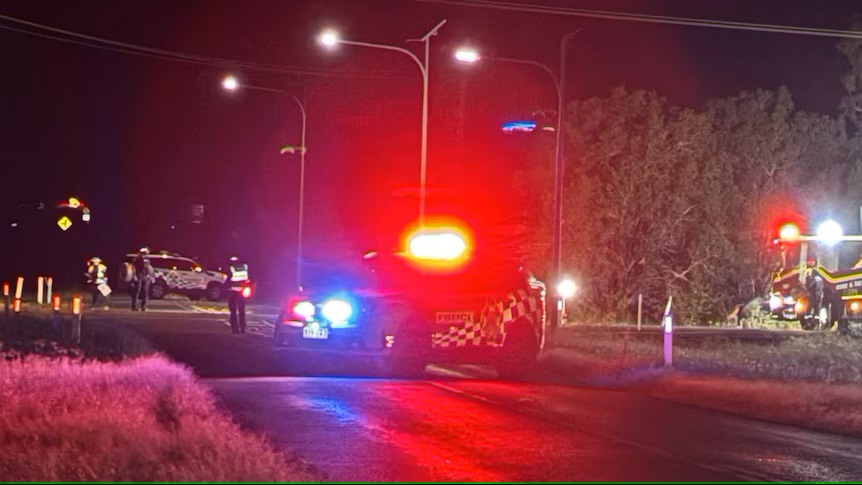Victoria Police and the Australian Workers Union (AWU) are urging Pacific Islander seasonal workers to take care while driving, as new figures reveal PALM workers are six times more likely to die on Australia’s roads.
The AWU has also reiterated calls on workers and employers to ensure PALM workers are well-versed with driving rules.
Figures obtained by the ABC reveal at least 10 road deaths of Pacific Australia Labour Mobility (PALM) workers have been reported in the last 12 months.
With about 30,000 PALM workers in Australia as of October, that equates to about 30 deaths per 100,000 people — more than six times the national average of 4.8 per 100,000.
The latest was three weeks ago when a 36-year-old Solomon Islander was killed along a Queensland highway after the car he was driving in collided with another.
It came after 25-year-old Vanuatu fruit picker Austin Kalkandi was also killed in a collision in Queensland last month. The driver of the van he was in, fellow Vanuatu national Reginald Toa, has since been charged with causing the crash.
“A lot of the collisions and infringement from people from Pacific Islands are so easily avoidable,” said Victoria’s Road Policing Assistant Commissioner Glenn Weir.
Assistant Commissioner Weir said among the worst accidents he had assessed involved four Samoan seasonal workers in Northern Victoria in November last year.
The victims David Gasologa, Aperaamo Aleka, Alesana Anetelea and Darrick Amouta Peleti were driving home from a friend’s house near Mansfield when their rental car veered off the road and crashed into a tree.
Assistant Commissioner Weir said they were all under the influence of alcohol.
“The driver lost control. It crashed and caught fire, and all occupants were killed,” he said.
“Everyone has to be properly licensed to drive and that’s something VIC Roads needs to take care of. [You] have to be properly licensed or use an acceptable international license, but if you’re going to drive or use the roads, it is still your responsibility.”
Becoming familiar with Australian roads is just one challenge faced by Pacific seasonal workers who transition into Australia.
It’s a huge difference from roads in the Pacific Islands. In Samoa, for example, speed limits rarely go above 45 kilometres per hour, and in Tonga, there are no traffic lights or highways.
Every week, Tongan fruit picker Lioa Tupou often drives his fellow workers out to nearby towns for shopping or a getaway.
He said driving in regional Australia was very different to back home.
“You know the highest speed you can run in Tonga is 70km/hr … here in Australia, there are a lot of blind spots,” he said.
“Back home, I usually drive for no more than 30 minutes before reaching my destination. Here, I’d drive for hours.
“I’d get fatigued from driving and so I would stop the car to let someone else take over. It’s a little bit different to driving back in Tonga.”
In 2021, the Australian Workers Union issued a public statement demanding the Australian federal government address fatal road accidents involving PALM workers.
Jonathan Cook, a national organiser at the AWU, said it was common for those tasked with transporting their fellow workers to get behind the wheel to drive everyone home after working 12-hour shifts.
“What the union was concerned and what we’re still concerned about is what is that worker getting in terms of education, in terms of driving training and in terms of do they have a competency?” Cook said.
“Do they understand how to drive rural roads? It should really be on our government to ensure that every worker is suited to driving on the PALM scheme.
“It’s devastating, I’ve been personally called by our members who have either been in an accident or involved in an accident on their way to their workplace.
“We should develop better procedures when driving to and back from work and that includes everyone on the bus.”
Roads in rural Australia will be busy in the week leading up to Christmas, as many Australians living in the big cities drive to visit family or go on holiday.
Assistant Commissioner Wier is pleading with the public to take care when behind the wheel.
“We had a terrible collision not too long ago in Western Melbourne involving a Pacific Islander family who had too many people in the car including an unrestrained baby being held by mum in the front seat,” he said.
“Someone drove through a red light and hit them…the baby was seriously injured [and] is now in hospital.
“We’re hoping and praying the baby is going to be okay … but it just shows how easy it is to put people at risk,” he said.














